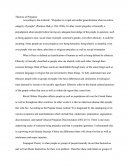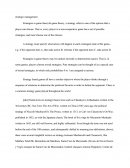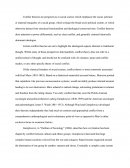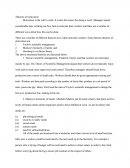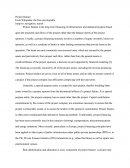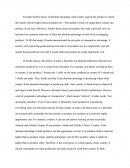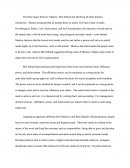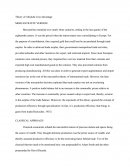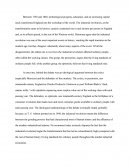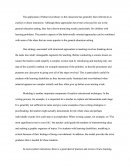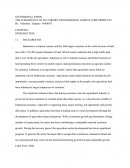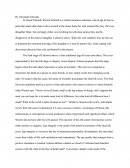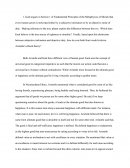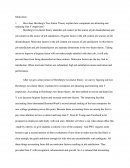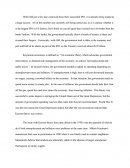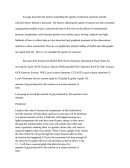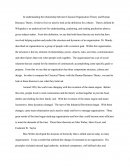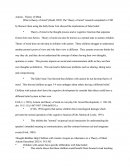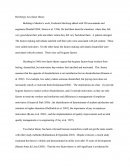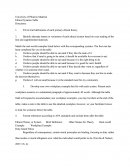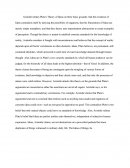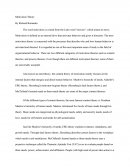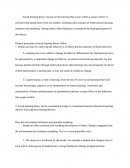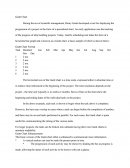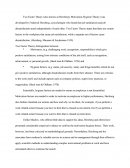Garbage Can Theory essays
Last update: December 1, 2015-
Theories of Prejudice
Theories of Prejudice According to the textbook; "Prejudice is a rigid and unfair generalization about an entire category of people" (Prentice-Hall, p. 284, 2006). In other words prejudice is basically a prejudgment about people before having any adequate knowledge of the people in question; such as being against a race, social class of people, someone's gender, even their ethnicity, it could be anything. Some people are even prejudice over being homeless, being elderly or disabled,
Rating:Essay Length: 1,086 Words / 5 PagesSubmitted: July 3, 2011 -
Strategic Management - Strategies in Game Theory
strategic management Strategies in game theoryIn game theory, a strategy refers to one of the options that a player can choose. That is, every player in a non-cooperative game has a set of possible strategies, and must choose one of the choices. A strategy must specify what action will happen in each contingent state of the game--e.g. if the opponent does A, then take action B, whereas if the opponent does C, take action D.
Rating:Essay Length: 794 Words / 4 PagesSubmitted: July 6, 2011 -
Conflict Theories Are Perspectives
Conflict theories are perspectives in social science which emphasize the social, political or material inequality of a social group, which critique the broad socio-political system, or which otherwise detract from structural functionalism and ideological conservativism. Conflict theories draw attention to power differentials, such as class conflict, and generally contrast historically dominant ideologies. Certain conflict theories set out to highlight the ideological aspects inherent in traditional thought. Whilst many of these perspectives hold parallels, conflict theory
Rating:Essay Length: 293 Words / 2 PagesSubmitted: July 6, 2011 -
Theories of Motivation
Theories of motivation Motivation is the will to work. It is also the reason for doing a work. Managers spend considerable time working out how best to motivate their workers and there are a number of different ways about how this can be done. There are a number of different theories as to what motivates workers. Some famous theories of motivation are: 1. Taylor's scientific management 2. Maslow's hierarchy of needs, and 3. Herzberg's two-factor
Rating:Essay Length: 398 Words / 2 PagesSubmitted: July 8, 2011 -
St Augustine Theory of the State
Project finance From Wikipedia, the free encyclopedia Jump to: navigation, search Project finance is the long term financing of infrastructure and industrial projects based upon the projected cash flows of the project rather than the balance sheets of the project sponsors. Usually, a project financing structure involves a number of equity investors, known as sponsors, as well as a syndicate of banks or other lending institutions that provide loans to the operation. The loans are
Rating:Essay Length: 2,557 Words / 11 PagesSubmitted: July 9, 2011 -
How Do the Theories of Absolute Advantage and Comparative Advantage Differ?
In Adam Smith's theory of absolute advantage, each country exports the product in which the country has the higher labour productivity----the number of units of output that a worker can produce in one hour. However, Smith's theory does not explain why trade could still carry on between two countries when one of them has absolute advantage in both of the exchanging products. To fill that empty, Ricardo demonstrated the principle of comparative advantage: A country
Rating:Essay Length: 361 Words / 2 PagesSubmitted: July 9, 2011 -
Compare and Contrast Theories: Maslow, McClelland and Herzberg
The three major theories: Maslow, McClelland and Herzberg all share distinct similarities. Maslow proposed that all people desire to satisfy five basic kinds of needs; Psychological, Safety, Love, Self-esteem, and Self-Actualization, the hierarchy of each need in the stated order, with the most basic being - physiological and safety needs - at the bottom. Maslow believes that the lowest-level needs must be met before a person will strive to satisfy needs higher up in the
Rating:Essay Length: 445 Words / 2 PagesSubmitted: July 9, 2011 -
Theory of Absolute Cost Advantage
Theory of Absolute Cost Advantage MERCANTILISTS' VERSION Mercantilism stretched over nearly three centuries, ending in the last quarter of the eighteenth century. It was the period when the nation-states were consolidating in Europe. For the purpose of consolidation, they required gold that could best be accumulated through trade surplus. In order to achieved trade surplus, their governments monopolized trade activities, provided subsidies and other incentives for export, and restricted imports. Since most European countries were
Rating:Essay Length: 4,668 Words / 19 PagesSubmitted: July 10, 2011 -
Classical Organizational and Management Theory
Between 1760 and 1860, technological progress, education, and an increasing capital stock transformed England into the workshop of the world. The industrial revolution, as the transformation came to be known, caused a sustained rise in real income per person in England and, as its effects spread, in the rest of the Western world. Historians agree that the industrial revolution was one of the most important events in history, marking the rapid transition to the modern
Rating:Essay Length: 1,031 Words / 5 PagesSubmitted: July 11, 2011 -
Thorndike and Skinner's Behaviorist Theory in the Classroom
The application of behaviorist theory to the classroom has generally been referred to as explicit or direct instruction. Although these approaches have been criticized for use in the general education setting, they have shown promising results, particularly for children with learning problems. The positive aspects of the behaviorally oriented approaches can be combined with some of the ideas that are more popular in the general education setting. One strategy associated with structured approaches to teaching
Rating:Essay Length: 669 Words / 3 PagesSubmitted: July 11, 2011 -
The Consistency of H-O Theory on Indonesian Agriculture Products
GIE PERSONAL PAPER THE CONSISTENCY OF H-O THEORY ON INDONESIAN AGRICULTURE PRODUCTS By : Valentina Tjahjani / 34408057 CHAPTER I INTRODUCTION 1.1 BACKGROUND Indonesia is a tropical country and the 16th largest countries in the world in terms of land area with 1,919,440 square kilometer of land. Which means, Indonesia has a high arable land that is very fertile for agriculture. Indonesia is rich in natural resources and billion hectares of land spreading from western
Rating:Essay Length: 6,902 Words / 28 PagesSubmitted: July 13, 2011 -
About Schmidt in Relation to Developmental Theories of Old Age
By Alexandra Edwards In About Schimdt, Warren Schmidt is a retired insurance salesman, who at age 66 has no particular plans other than to drive around in the motor home his wife insisted they buy. He's not altogether bitter, but not happy either, as everything his wife does annoys him, and he disapproves of the man his daughter is about to marry. When his wife suddenly dies, he sets out to postpone the imminent marriage
Rating:Essay Length: 839 Words / 4 PagesSubmitted: July 17, 2011 -
Aristotle Theory of Happiness
1. Kant argues in Section 1 of Fundamental Principles of the Metaphysics of Morals that every human action is motivated either by a subjective inclination or by an objective sense of duty. Making reference to the text, please explain the difference between the two. Which does Kant believe is the true source of rightness or morality? Finally, based upon this distinction between subjective inclination and objective duty, how do you think Kant would criticize Aristotle's
Rating:Essay Length: 1,622 Words / 7 PagesSubmitted: July 19, 2011 -
How Does Herzberg's Two-Factor Theory Explain How Companies Are Attracting and Retaining Gen Y Employees?
Motivation 1. How does Herzberg's Two-Factor Theory explain how companies are attracting and retaining Gen Y employees? Herzberg's two-factor theory identifies job context as the source of job dissatisfaction and job content as the source of job satisfaction. Hygiene factor in the job context are sources of job dissatisfaction. Motivator factors in the job content are sources of job satisfaction. In this theory, job satisfaction and job dissatisfaction are separate dimensions in the two-factor theory.
Rating:Essay Length: 2,657 Words / 11 PagesSubmitted: July 19, 2011 -
Economic Theory - Gm Ipo Issue
With GM just a few days removed from their successful IPO, it is already being touted as a huge success. All of the numbers are currently still being sorted out, so it is unclear whether it is the largest IPO in US history, but I think we can all agree that it turned out a lot better than the banks' bailout. With the banks, the government basically threw a bunch of money at them and
Rating:Essay Length: 1,369 Words / 6 PagesSubmitted: July 19, 2011 -
Factors Controlling the Speeds of Chemical Reactions and the Collision Theory
his page describes the factors controlling the speeds of chemical reactions and the collision theory behind it discussed. The factors affecting the speed of reaction are also presented using particle models to give a theoretical basis to the rules on the effects of concentration, pressure, temperature, solid reactant particle size (surface area), stirring, catalysts and light. Methods of how to collect data are also described and graphical treatment of the observations and how to draw
Rating:Essay Length: 487 Words / 2 PagesSubmitted: July 22, 2011 -
Compare and Contrast Classical and Organizational Theory
In understanding the relationship between Classical Organization Theory and Human Resource Theory, I believe first we need to look at the definition for a theory. Theory defined by Wikipedia is an analytical tool for understanding, explaining, and making predictions about a given subject matter. From this definition, we see that both these theories are tools that have involved helping explain and predict the structure and dynamics of an organization. Dr. Moody described an organization as
Rating:Essay Length: 1,390 Words / 6 PagesSubmitted: July 30, 2011 -
Autism - Theory of Mind
Autism - Theory of Mind What is theory of mind? (Dodd, 2005) The "theory of mind" research completed in 1985 by Baron-Cohen using the Sally/Anne Test showed the implications of false belief. * Theory of mind is the thought process and or cognitive function that separates fiction from non-fiction. Theory of mind can also be known as a mental state in autistic children. Theory of mind does not develop in children with autism. These children
Rating:Essay Length: 327 Words / 2 PagesSubmitted: August 4, 2011 -
Herzberg's Two-Factor Theory
Herzberg's two-factor theory Building n Maslow's work, Frederick Herzberg talked with 200 accountants and engineers (Ramlall 2004; Steers et al. 1996). He had them describe situations where they felt very good about their jobs and others where they felt very bad about them. A pattern emerged. The factors making individuals satisfied with their jobs were associated with job content. These were called motivators. On the other hand, the factors making individuals dissatisfied were associated with
Rating:Essay Length: 312 Words / 2 PagesSubmitted: August 4, 2011 -
Ethics Theory Table
University of Phoenix Material Ethical Systems Table Directions: 1. Fill in brief definitions of each primary ethical theory. 2. Identify alternate names or variations of each ethical system based on your reading of the text and supplemental materials. Match the real-world examples listed below with the corresponding systems. The first one has been completed for you in the table. a. I believe people should be able to eat sand if they like the taste of
Rating:Essay Length: 625 Words / 3 PagesSubmitted: August 8, 2011 -
Aristotle Refutes Plato's Theory
Aristotle refutes Plato's Theory of Ideas on three basic grounds: that the existence of Ideas contradicts itself by denying the possibility of negations; that his illustrations of Ideas are merely empty metaphors; and that they theory uses impermanent abstractions to create examples of perception. Though the theory is meant to establish concrete standards for the knowledge of reality, Aristotle considers it fraught with inconsistencies and believes that the concept of reality depends upon all forms'
Rating:Essay Length: 286 Words / 2 PagesSubmitted: August 10, 2011 -
Motivation Theory by Richard Romando
Motivation Theory By Richard Romando The word motivation is coined from the Latin word "movere", which means to move. Motivation is defined as an internal drive that activates behavior and gives it direction. The term motivation theory is concerned with the processes that describe why and how human behavior is activated and directed. It is regarded as one of the most important areas of study in the field of organizational behavior. There are two different
Rating:Essay Length: 379 Words / 2 PagesSubmitted: August 10, 2011 -
Social Learning Theory
Social learning theory focuses on the learning that occurs within a social context. It considers that people learn from one another, including such concepts as observational learning, imitation, and modeling. Among others Albert Bandura is considered the leading proponent of this theory. General principles of social learning theory follow: 1. People can learn by observing the behavior is of others and the outcomes of those behaviors. 2. Learning can occur without a change in behavior.
Rating:Essay Length: 1,177 Words / 5 PagesSubmitted: August 12, 2011 -
Management Theory
Gantt Chart During the era of scientific management, Henry Gantt developed a tool for displaying the progression of a project in the form of a specialized chart. An early application was the tracking of the progress of ship building projects. Today, Gantt's scheduling tool takes the form of a horizontal bar graph and is known as a Gantt chart, a basic sample of which is shown below: Gantt Chart Format Task Duration Jan Feb Mar
Rating:Essay Length: 469 Words / 2 PagesSubmitted: August 13, 2011 -
Herzberg's Motivation-Hygiene Theory
Two Factor Theory (also known as Herzberg's Motivation-Hygiene Theory) was developed by Frederick Herzberg, a psychologist who found that job satisfaction and job dissatisfaction acted independently of each other. Two Factor Theory states that there are certain factors in the workplace that cause job satisfaction, while a separate set of factors cause dissatisfaction. (Herzberg, Mausner & Snyderman 1959). Two Factor Theory distinguishes between: * Motivators; (e.g. challenging work, recognition, responsibility) which give positive satisfaction, arising
Rating:Essay Length: 2,304 Words / 10 PagesSubmitted: August 13, 2011
